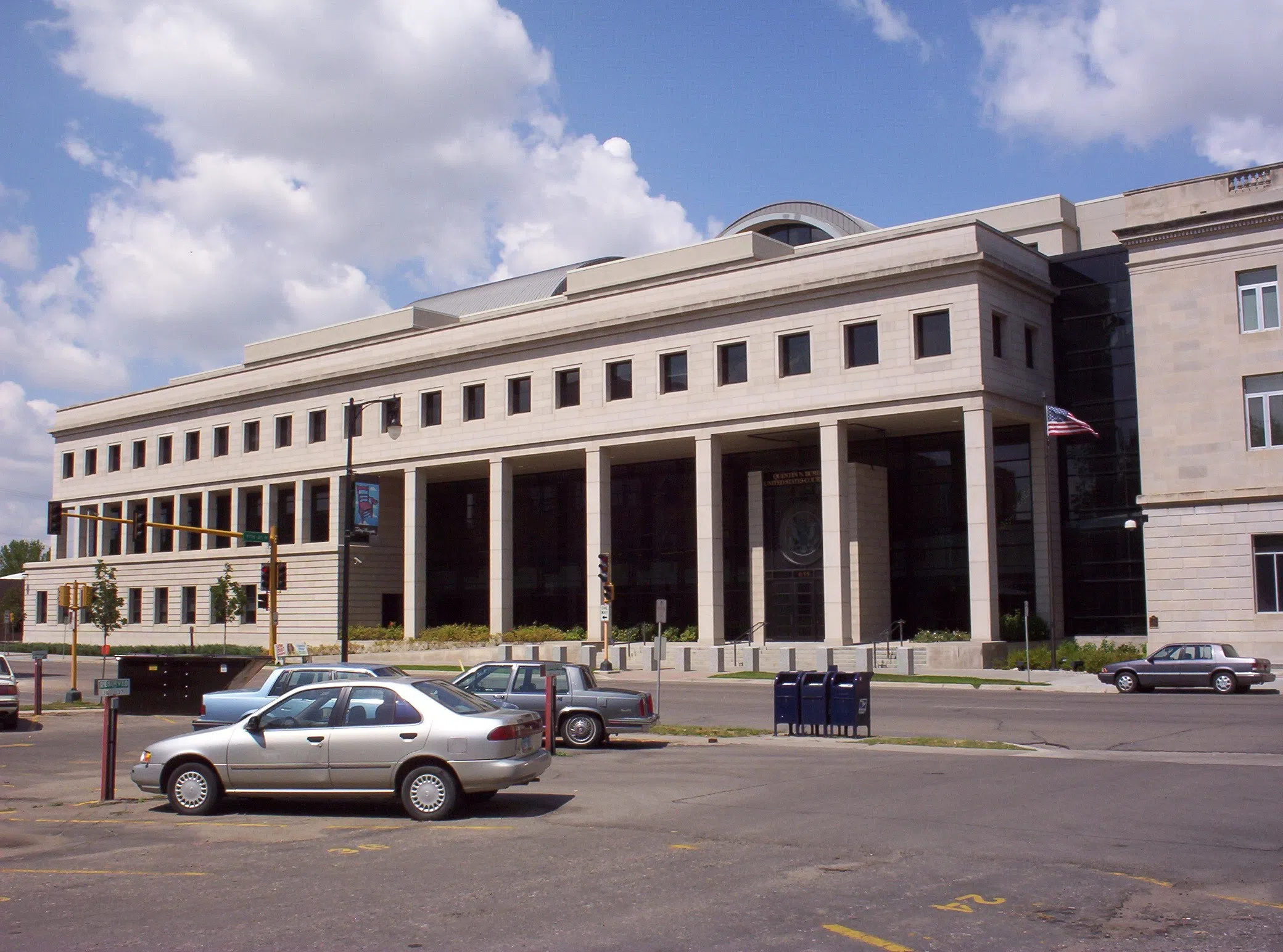
Federal Courthouse in Fargo
By: Mary Steurer
BISMARCK, N.D. (North Dakota Monitor) – North Dakota attorneys and judicial officials say a lack of funding for a key federal program could harm federal defendants’ ability to get quality representation.
The U.S. Constitution protects criminal defendants’ right to an attorney. When federal defendants can’t afford a lawyer, they are typically assigned a federal public defender. About 40% of the time, however, federal defenders must pass the case to a private lawyer due to a conflict of interest, according to the judicial branch.
But the federal judiciary says that as of July 3, it has no more money to pay outside attorneys for these services. The judicial branch has asked Congress for roughly $116 million to sustain the program until the fiscal year turns over on Oct. 1.
The federal courts draw from panels of approved private defense attorneys when federal public defenders cannot take a case. North Dakota’s pool of private attorneys usually averages around 100 people, said Jason Tupman, the federal public defender for North Dakota and South Dakota.
However, membership with the panels is voluntary, and about 10 attorneys have resigned from North Dakota’s since the judicial branch learned of the impending budget shortfall this spring, he said.
“The vast majority of our panel are either very small lawyers and oftentimes solo practitioners,” Tupman said. “Anytime you’re saying, ‘Hey, you’re not going to get a paycheck for three months for money we owe you,’ that’s going to have an impact on them.”
The U.S. District Court for North Dakota as of Tuesday had $110,000 in pending payments to panel lawyers, according to Clerk of Court Kari Knudson. The lack of federal funding also means that any expert witnesses or court reporters the attorneys hire also won’t get paid, she said.
Some of the defense attorneys who have withdrawn are among the most experienced in the state, said Mark Friese, who serves as the liaison between North Dakota’s panel and the federal judiciary.
“Some of them that have elected not to renew are really, really good lawyers,” he said.
Tupman and Friese last week sent a letter to North Dakota’s congressional delegation calling attention to the budget gap.
“Without reliable funding, attorneys will continue to withdraw, decline appointments or delay critical work,” they said in the letter. “Trials will be postponed, and the effectiveness of our federal courts will be significantly compromised.”
Friese, who has served on North Dakota’s panel for nearly 25 years, said he’s seen payments to attorneys deferred in the past due to budget issues but never for several months.
“I haven’t seen one like this where we have to go out and tell our panel lawyers they can’t be paid and they won’t be until sometime after October,” he said.
Tupman said some attorneys who are still serving on the panel appear less willing than usual to accept new appointments. He said he suspects this could be due to the funding gap, though it’s hard to know for sure.
He said panel attorneys in South Dakota are tracked differently, so he’s not aware of whether it is also seeing membership diminish.
Some defense attorneys are continuing to accept appointments without pay.
“The lawyers that do this just do this out of a sense of commitment,” Friese said. “With criminal cases in North Dakota, the economic reality is these lawyers can make more money by doing things on their own or with their firm than by taking these cases.”
About 90% of federal criminal defendants can’t afford to hire an attorney, according to the federal court system.
Generally, the judicial branch pays all panel attorneys $175 per hour. This is lower than the market rate, said Friese.
Spokespeople for Rep. Julie Fedorchak and Sen. John Hoeven, both Republicans, told the North Dakota Monitor they are looking at the issue.
North Dakota Gov. Kelly Armstrong, a former defense attorney, said he plans to speak to members of Congress about the situation when he’s in D.C. this week for a congressional hearing.
“It’s a real problem,” he said in a statement to the North Dakota Monitor.
Since October of last year, the U.S. District Court for North Dakota has paid outside attorneys more than $2.7 million to represent defendants, Knudson said.
Chief Judge Peter Welte said that the funding gap has yet to have a noticeable impact on his court.
“The court is continuing to function well, and on a day-to-day operations standpoint, I don’t feel like we’ve been suffering yet,” he said.
Still, Welte said the deficit worries him. He said he anticipates money will remain a problem for federal courts in the upcoming fiscal year.
“The federal budgeting process has been a constant issue since I took the bench,” he said.
The current funding gap comes as the district court is on track to outpace last year’s caseload in all categories, he added.
North Dakota U.S. District Court Judge Dan Traynor said he also isn’t aware of any immediate impacts to his court, but was critical of the shortfall.
“This is no way to run a railroad much less the U.S. government,” he said in a statement to the Monitor.
Federal defenders offices nationwide have been under a hiring freeze for almost two years. As a result, the Federal Defenders Office for North Dakota and South Dakota is staffed at 80-90% capacity, Tupman said. His office has 51 employees.
“It makes for higher case loads and more stress,” he said.




Comments